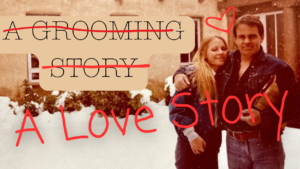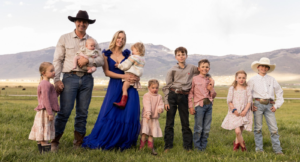Part I
I grew up in a small town, and as a kid, I always wanted to get out. I was curious, energetic, imaginative. I wanted adventures like the kids in The Magic Treehouse and Gregor the Overlander. But as soon as I had the chance to get away from home, I suffered for it.
Even just going away to college, and studying abroad a few times, always in 1-6-month stints, I missed my family too much. I grew up with a close family, so breaking out of that framework was difficult and strange for me. The homesickness felt like a physical sickness; it weighed on me. But I always had that promise of going home in a few months, a few weeks, and every time, I was surrounded by peers. Even when I was in foreign countries, I was in programs from the U.S., and almost all my friends were other North American students.
Then, in 2018, I moved to the Galapagos Islands for one year. The Galapagos belong to Ecuador, so most of the people who live there are Spanish speakers from the mainland. There, I had no Internet connection in my apartment, and the people who spoke English usually came and went, so I would have friends who spoke my native language for a just few weeks at a time.
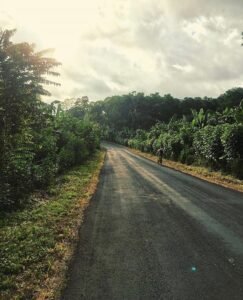
I also didn’t have a lot of necessary skills to take care of myself in that context. Much of our lives in The States is structured around comfort, efficiency, and ease. So, imagine going from being able to buy ready-made meals and mochi balls for dessert from Trader Joe’s to going to the market to get food, and they give you a fish with eyeballs and scales that was swimming that morning.
I didn’t know how to cook for myself, how to stop getting sick from the water, how to build community, and I still didn’t really speak Spanish yet. So I became isolated. I would go long weekends without speaking to anyone, just waiting for Monday so I could see my students again, even though most of them were under ten years old.
I think there is a very particular loneliness that comes with being an immigrant. Not knowing the local language is part of it, but you also, depending on how different your cultures are, don’t know the social rules. And, if you continue to follow the social rules that you learned were “correct,” then you can very easily commit social faux pas, and come across as rude or weird or uneducated without even knowing that you did anything wrong.
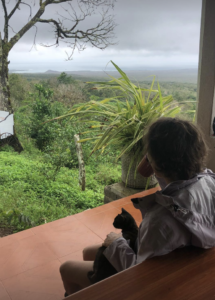
We all tell ourselves a certain story about who we are. We find things that we can be proud of or things that set us apart from others and make us relevant. Maybe you tell yourself: I’m kind. I’m charismatic. Then suddenly, you’re in a new culture, and you have to grapple with the reality that no one you know sees you that way anymore.
Maybe you defined yourself by the school you got into, the sport you’re good at, the brand you wear, the neighborhood you’re from. Well, now, no one’s heard of that sport, or that school, or that brand, or that neighborhood, all they know, is that you don’t know how to de-scale and de-bone a fish, so maybe you aren’t very smart. You have to build a new identity. It shakes the foundations of your sense of self.
Another aspect that can make immigrant loneliness so powerful, and this is probably exacerbated by the fact that I’m a woman, is feeling unsafe. I had this fear that would keep me up at night. I was scared I would die, and no one would notice or no one would come to my funeral and my parents would have to figure out how to get me home. It sounds dramatic (because it was), but this was a very present fear for me. When you spend so much time alone, it’s easy to go down the rabbit hole.
The word “homesickness” almost doesn’t feel like enough, because I wasn’t just missing my home. I was grieving the loss of everything I had left behind. I was missing my parents, missing my language, missing my culture, missing my food, missing who I used to be, missing the simple act of “having the answers,” or at least some of them. And I felt lonely when I spoke to some people back home as well because I started to feel like I was developing this whole new version of myself that they didn’t see or understand or care to learn about.
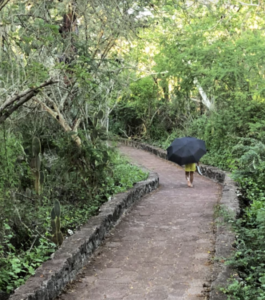
I want to clarify that I loved my time in the Galapagos. I’m so glad I didn’t go home because I was feeling isolated. The natural beauty of the islands is so alive and abundant that many times, just the natural life, the flora and fauna, it felt communicative, transcendent, and eternal in a way that makes you release your little human pains into the air. I read constantly. I wrote. I downloaded music albums by plugging my phone in in the school lobby overnight to use their slow WiFi, then, the next morning, when it was downloaded, I would lie on my bed and listen to the whole album from beginning to end. I studied Spanish with a thick, humid notebook and a pencil in the company of geckos and owls and tortoises. I loved it there.
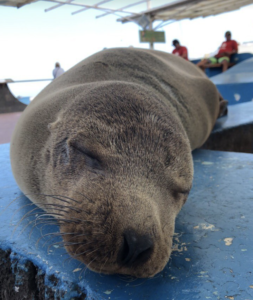
Then, I had some issues with my housing contract, which was tied to my work contract, and I had a few more weeks before flying out, and nowhere to stay. Now, I am from the U.S. Compared to a lot of cultures in Latin America, professional environments tend to have a bit more distance. So I complained about my housing situation to my students, not expecting anything really, just to vent. Instead, every single student who I talked about it with, from five years old to adult, said, “Come stay at my place,” like it was the most obvious, casual response. And I did end up staying with two students, a married couple. I didn’t speak Spanish, and they didn’t speak English. But I didn’t have a place to stay. So they slept on the couch so that I could have their bed.
And that was a lesson. But it was a lesson that I would have to repeat multiple times before I received the message that was being sent.
Part II
I left the Galapagos in 2019 and went to Buenos Aires, Argentina. I didn’t want to go back to the States yet, but I wanted a new, different adventure in a place where there were a lot of people my age. You can understand why I might be craving a big, populated city at that point. Within about a month, I met my husband. That’s a different story.
Fede, my husband, and I, we really bonded over the fact that both of us were foreign. He was my emergency contact, I think, about a month after we met. Fede is from Colombia. He came to Buenos Aires to play basketball at the Universidad de Buenos Aires when he was 18. He is his mom’s only child, so when he had a business and things started going well for him here in Argentina, he told his mom, my mother-in-law, Nancy, to move to Argentina to live with him.
Nancy was taking care of her own mom, Lucy, so she couldn’t come at first. But then Lucy passed away, so Nancy decided to move to Argentina into Fede’s apartment. Fede and I had been together for six months when we also decided to move in together. I was reluctant to live with my boyfriend’s mom, but she traveled a lot for work, so she wasn’t really gonna be around. So I lived there for two weeks, and then the pandemic hit. And that is how I ended up living in a one-bedroom apartment with my boyfriend and his mom for one year of strict quarantine in a foreign country. If you’re curious about that experience, check out Argentine Quaratine with my Mother-in-Law which I wrote in 2022.

Nancy and I did not get along at first. We came from very different backgrounds. Nancy was a single mom in Bogota in the 90s and early 2000s, I mean, she learned that to be a woman in this world, you need to be tough as nails, and she wanted her son to be with a strong woman. Someone berraca. Brava. Con caracter pues! But for me, I had learned that to show respect to your boyfriend’s mom, you should be grateful, submissive, unproblematic. For example, the idea of arguing with my boyfriend’s mom honestly sounded bizarre to me. If I didn’t like a meal she made, I would still say, “Yes, thank you for the food. I love mondongo. I love that it smells like cow farts. I’ll eat the whole plate.” And she interpreted what I thought were good manners as lack of a backbone and lack of sincerity.
She was also much more organized than me and much more capable, and she often bore the brunt of a lot of the household labor. She was impatient, and if I didn’t know how to do a household task, like mop, she would take the mop out of my hands and do it for me while she told me off in Spanish like y cuántas veces te he dicho que cuando todavía hay jabón en el piso es que no has terminado. Mira que está resbaloso y brilla por la cantidad de jabón que dejaste y vió? Ni siquiera está limpio porque todavía hay polvo en esa esquina. Nothing will motivate you to learn a new language like a pissed off mother-in-law.
And Argentina’s quarantine was strict. And there were no flights aside from emergency flights provided by the embassy and the borders were closed all over the world. So, if I went home, I didn’t know when or if I would see Fede ever again. Businesses all over the city hung up big signs that said, “We couldn’t survive the pandemic,” if we walked more than three blocks from our home, we could be sent back by police.
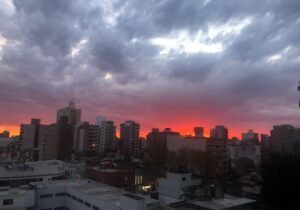
Plus, there was a period of time when, it felt like every night when we watched the news in Argentina, they were talking about how badly the United States was handling the pandemic. I heard about excess deaths, I saw the videos of refrigerated trucks carrying bodies through the streets of New York. While we were locked inside, we heard that in The States, there were people who refused to wear masks or quarantine, which was essentially unheard of where we were living, and it provided a stark and scary contrast.
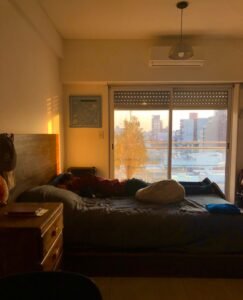
My mom had beat lung cancer just a few years prior, and, if you remember, we didn’t know much about the virus for a while, so we were panicked that she would get it from touching the handle of a door or through the pipes in our house, I mean, in those early days, it felt like the virus felt so ubiquitous. I was 24. I turned 25 in May 2020. It was so hard for me to stay in Argentina with Fede and Nancy, instead of catching an emergency flight home through the U.S. embassy. I felt grief for the life I left behind back home, the life I thought I would have, the family I was born with, who was spending the pandemic together and bonding through the experience, I suffered so much for the lack of those things that there were times when I figured that I would never get over that pain. I thought that homesickness was just going to become an aspect of myself that I would have to learn to live with. And I thought about it all the time and I cried about it and prayed about it and fought about it. But I stayed.
With all the Buenos Aires pizzerias closed, Fede started making these awesome, thick-crust homemade pizzas every Friday. Sometimes there were power outages and we would play hide and seek through the whole building and get really into it.
I remember once, Fede and I were doing foot races up the parking garage ramp, and Nancy hung out the window and started yelling at us, pretending to be an angry neighbor. Then the other neighbors caught on, and started choosing a side in our races, then when I finally beat Fede, the women in our building cheered for me and I was laughing and jumping around celebrating.
Even though we weren’t supposed to, we would go on day-long walks around the shut-down city, in the process arguing and making up and arguing again then laughing it off and coming home exhausted and happy and feeling like we had already spent many lifetimes together.
As my Spanish improved, Nancy and I became very close friends. (We’re still very close.) I braided her hair while I talked about my family and my mom, Claire, and she talked about her family and Lucy, and we both told each other about the lives we left behind in the US and in Colombia, and the people we left behind, or the people who left us behind, and I realized that I had spent so much of the quarantine selfish enough to think that I was the only one in the house who missed my mom.
Part III
Fast forward to 2021, Fede and I were digital nomads, which is someone who works remotely and travels. (We had been working online since before the pandemic because of the Argentine inflation crisis; we wanted to earn in a more stable currency.)
For a lot of 2021 and 2022 we were living in Puerto Escondido, Mexico, on the southern coast of Oaxaca. Puerto is an old surfing town. Originally famous for big wave surfing, it’s now also becoming a pretty popular digital nomad destination. Puerto is wild, fun, beautiful, sunny, abundant, risky. The waves are so big there, sometimes they get so high that they block the sun. So you could be sitting, talking on the beach and suddenly find yourself engulfed in a shadow, then when the waves come crashing down, the weight shakes the earth.
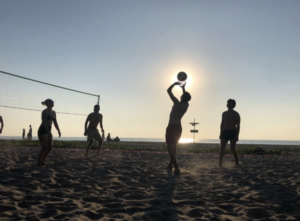
So one day, we were playing beach volleyball with a friend from Chile, Carlos, and after we finished the game, he said, let’s go cool off in the water. I was a lifeguard in high school school and college. I was on swim team. So hubris was an issue as well (never start to fancy yourself stronger than Mother Nature). We ran into the waves, but they were pretty big that day, so we swam out past the break to avoid them. Mistake. We started getting tired, so we tried to swim in. And we just kept getting caught in this cycle of trying to get shore, and a huge wave would come, slam you, and pull you back out.
And the waves would come in sets, so you would just be getting out of one wave, and have a moment to come up and breathe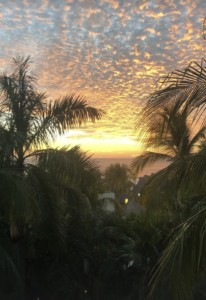 and you would immediately see another wave ready to take you down and sometimes you would come up for your one second to breathe and breathe in just foam and water, then get slammed again without ever having a chance to get your breath and as this was happening, the waves were pushing us closer and closer to this collection of rocks, so at one point I got slammed and as I was getting pulled back out, I hit some rocks underwater, and I panicked and I came up and started shouting to Fede, “There are rocks! Be careful, there are rocks underwater!” And there were people fishing nearby so I started yelling “Help! Help us!” whenever I could, but the waves were so big and loud that they couldn’t hear us.
and you would immediately see another wave ready to take you down and sometimes you would come up for your one second to breathe and breathe in just foam and water, then get slammed again without ever having a chance to get your breath and as this was happening, the waves were pushing us closer and closer to this collection of rocks, so at one point I got slammed and as I was getting pulled back out, I hit some rocks underwater, and I panicked and I came up and started shouting to Fede, “There are rocks! Be careful, there are rocks underwater!” And there were people fishing nearby so I started yelling “Help! Help us!” whenever I could, but the waves were so big and loud that they couldn’t hear us.
But, while all of this was happening, our friend, Carlos, managed to get onto dry land so in an adrenaline rush, he went sprinting up to a gym on the beach for help and a small group of guys came running down and borrowed some kids’ surfboards and they came in to rescue us and as soon as my hands hit the surfboard and they started pulling me in, Carlos saw that, and he collapsed from exhaustion into the sand and started vomiting water. It was just the adrenaline that had made him capable of saving us. So Fede gotten out just before me; I had gone out farther into the water when I freaked out because of the rocks. And when I got to the sand, I was in this dazed, dizzy, accelerated state, and I saw Carlos, but I didn’t see Fede, so I stopped two of the guys who had saved me, these middle-aged Aussies and I started saying, “Where’s Fede?” (As if they knew him). They thought at first that someone else was out in the water, but when I clarified who I meant, they pointed to him on the beach, and I saw him, and I could finally breathe again. Then suddenly, the one Australian guy, who was about my dad’s age, was overcome with relief, and he wrapped me in a a big hug. And I held onto him, and I said, like a little kid, “That was really scary.” And he said, “Yeah. You’re okay now, though. It’s okay.” And my heart rate went down, and he left, and I never knew his name or even had a conversation with him, but I was struck by the fact that this perfect stranger, who had helped save my life, was so relieved that I was okay. And he was far from home, too. He probably knows what it is to miss someone. And to worry about them. Maybe he had someone on the other side of the world who he hoped would also be pulled out of water and comforted once on dry land.
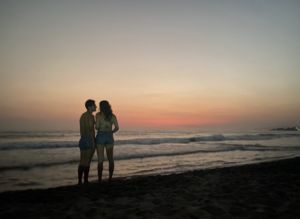
Part IV
Last year, I had a medical emergency here in Buenos Aires in the wintertime. I was in my apartment, and I was bleeding a lot, and my husband called an ambulance. When the EMT came up to our room, he said, if we take her, then we’ll legally have to take her to the public hospital, but she might get better or faster service at a private hospital if you can get there on your own. We don’t have a car, so we wrapped all of our towels around my waist and called an Uber to take us to the private hospital.
The Uber driver was a middle-aged woman, a little younger than my mom, and Fede held me so I wouldn’t feel the bumps in the road. Even in my woozy state, I was worried about bleeding in the back seat, but the Uber driver was gentle, careful, and kind. Every time she hit a bump, she apologized. She said to me, in a language that I wouldn’t have understood a few years prior, “It’s okay, honey. Don’t worry. We’ll get you there safe.” It was the type of scenario that at one point would’ve sent me down the rabbit hole: I’m gonna die. I’m gonna die far from home. My parents will have to come get me. But instead, I, again, felt cared for by a stranger. Despite feeling dizzy and pained, I looked out the window at the city lights and the people walking on the street and I saw them as my brothers and sisters and I felt at peace with reality. I realized that I thought I had lost my home. I thought I had lost my family. But at some point, in the last five years, the whole world became my home, and every person became my family. I came in contact with the universal truth that you can never run away from love. No matter how far you go, love will find you.
_______________________
Sign up for my newsletter to know when I publish new stuff: https://www.surveyhero.com/c/ck4sfziw
Contract writing or editing services: https://inklessagency.com/
Watch this blog post as a video essay:



